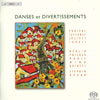Danses et Divertissements
These Berliners effortlessly capture the joy in this handful of French fancies
View record and artist detailsRecord and Artist Details
Composer or Director: (Claude) Paul Taffanel, Francis Poulenc, Henri Tomasi, André Jolivet
Genre:
Chamber
Label: BIS
Magazine Review Date: 1/2010
Media Format: Hybrid SACD
Media Runtime: 0
Catalogue Number: BIS-SACD1532

Tracks:
| Composition | Artist Credit |
|---|---|
| Wind Quintet |
(Claude) Paul Taffanel, Composer
(Claude) Paul Taffanel, Composer Berlin Phil Wind Qnt Stephen Hough, Piano |
| Sextet for Piano and Wind Quintet |
Francis Poulenc, Composer
Berlin Phil Wind Qnt Francis Poulenc, Composer Stephen Hough, Piano |
| Sérénade |
André Jolivet, Composer
André Jolivet, Composer Berlin Phil Wind Qnt Stephen Hough, Piano |
| Danses Profanes et Sacrées pour quintette à vent |
Henri Tomasi, Composer
Berlin Phil Wind Qnt Henri Tomasi, Composer Stephen Hough, Piano |
Author: Geoffrey Norris
Poulenc’s Sextet, however, is instantly recognisable. Those pert phrases and his typical mix of popular idioms, smoky tunes and perfumed harmony are all there in this cheeky piece. Stephen Hough joins the wind-players for a spry performance that keeps things bubbling along, rising to the romantic heights but also keeping them in check, neatly pricking any balloon of emotion that might risk becoming too inflated.
Explore the world’s largest classical music catalogue on Apple Music Classical.
Included with an Apple Music subscription. Download now.

Gramophone Digital Club
- Digital Edition
- Digital Archive
- Reviews Database
- Events & Offers
From £9.20 / month
Subscribe
Gramophone Club
- Print Edition
- Digital Edition
- Digital Archive
- Reviews Database
- Events & Offers
From £11.45 / month
Subscribe
If you are a library, university or other organisation that would be interested in an institutional subscription to Gramophone please click here for further information.






